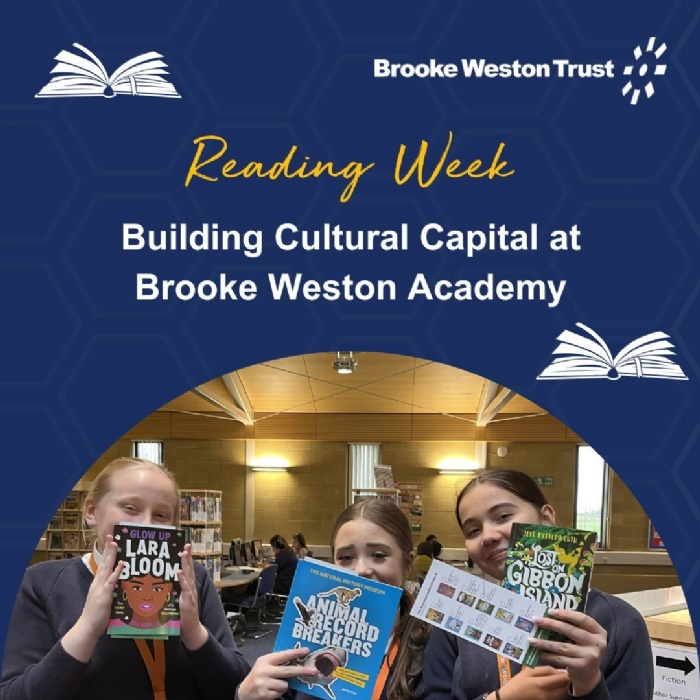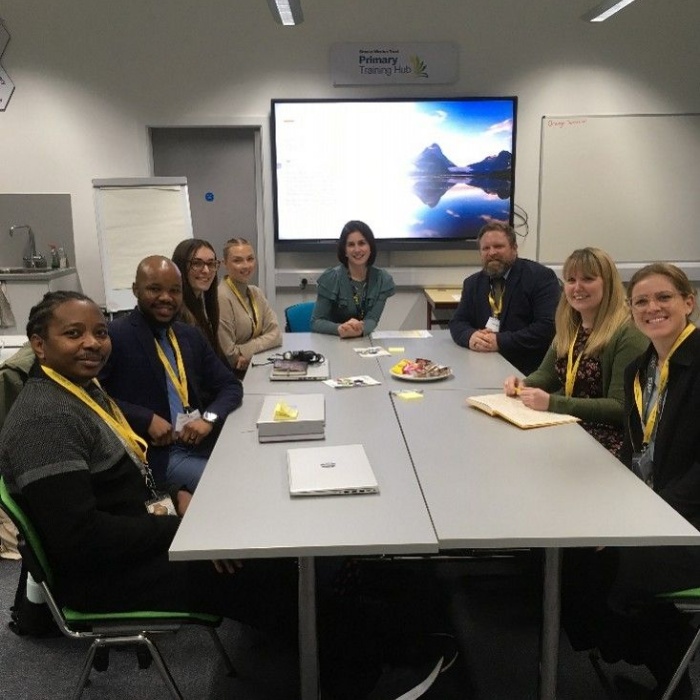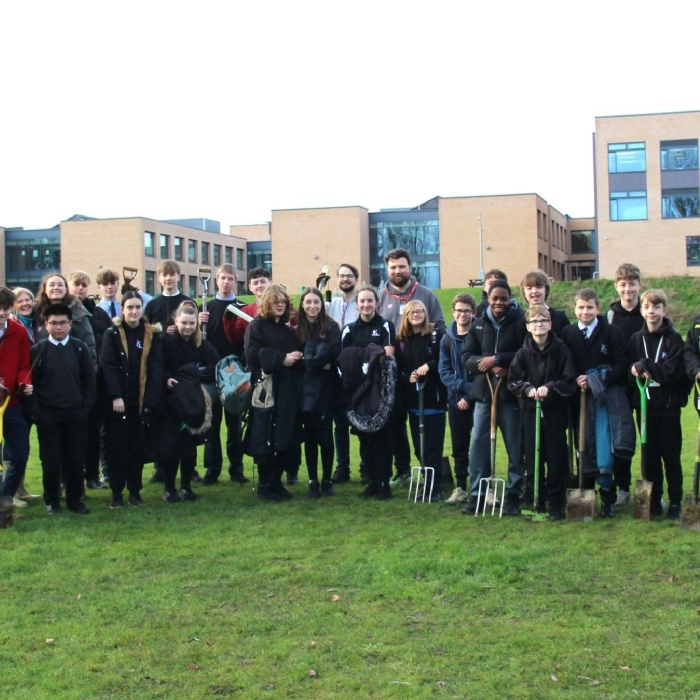Reading Week at Brooke Weston Academy: Building Cultural Capital
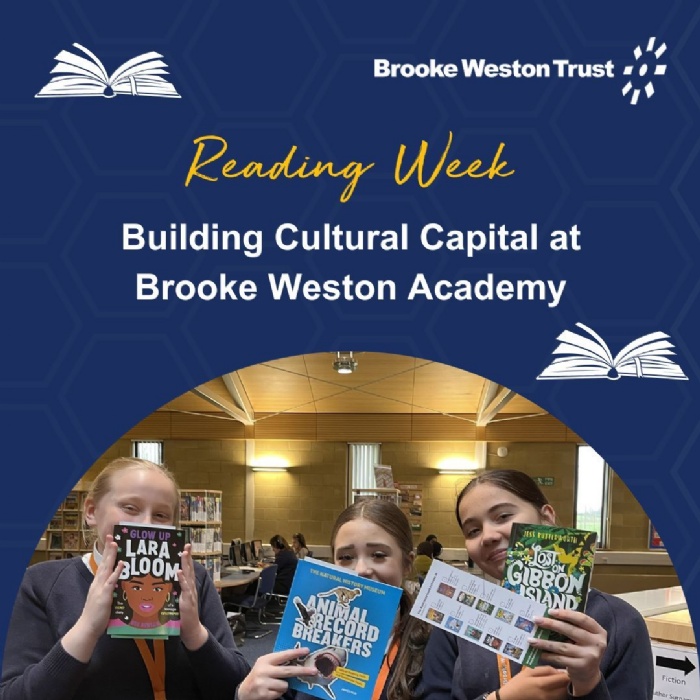
“Reading Week is about emphasising how important reading is, regardless of subject or future aspirations. It's designed to be an empowering moment that showcases reading as key to success in all areas of life.”
- Lauren Fitzjohn, Literacy Lead at Brooke Weston Academy
At Brooke Weston Trust, Literacy & Reading is an educational strategic priority. We believe this skill forms an essential ‘ticket for life’ for our 3-19 year old learners, enabling them to effectively access learning, communicate confidently, and develop critical life-skills. Lauren Fitzjohn, Literacy Lead at Brooke Weston Academy (BWA), has been instrumental in developing ideas that bring this vision to life - here, she shares her insights on her new reading week initiative.
So Lauren, what is Reading Week?
Reading Week was created this academic year at BWA to spotlight specially selected texts that are insightful and provide opportunities for classes to read together, decode, analyse, and discuss.
While it's called Reading Week, it's actually about both reading and oracy. Students practise reading aloud, working on expression, and discussing ideas and challenging concepts they may not normally encounter in the regular curriculum.
It's an opportunity to highlight the importance of reading across all subjects, not just in English. For example, in maths, students might learn about key historical figures like Ada Lovelace, connecting reading to cultural capital and potential career paths.
Every department has a literacy representative who has the autonomy to select the most appropriate texts for the students within their subject, either fiction or non-fiction. I then manage a central hub that all the resources go into, enabling me to see exactly what Reading Week looks like for each year group in each subject.
What inspired the creation of Reading Week and why was it introduced?
We used to have reading in our tutor time but decided to move it into the actual subject areas because we felt it was important and deserved to be part of the main curriculum. On average, each student will read approximately 2,500 additional words during Reading Week in just 20 minutes of reading a day.
The goal is to make literacy everyone's responsibility and part of everyone's curriculum. We are trying to expose students to more language opportunities, cultural capital, and encourage rich discussions. We hope this will encourage lifelong reading habits, especially for students who might not have reading modelled at home.
How does Reading Week fit into BWA’s broader literacy strategy?
We have a new Reading Charter at BWA which is split into four key areas. Firstly, it's about thinking about the speaker and communication, which we cover with the oracy aspect. Secondly, it's about having a broad and ever-increasing vocabulary, which we do by decoding keywords in everyone's reading material. The third aspect is reading aloud fluently as part of our reading charter and students are expected to do a small segment using techniques like choral reading. Finally, we are promoting a love of reading, hopefully inspiring and creating intrigue.
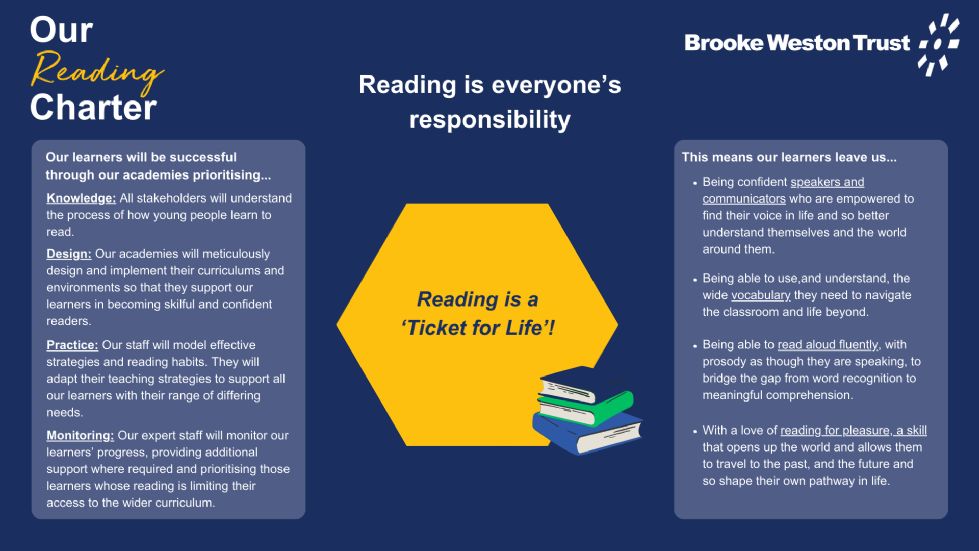
We also build on cultural capital and expose students to a variety of fiction and non-fiction texts. It's about showing students that reading isn't just picking up a fictional story; it could be reading the news or about science or space exploration.
What challenges did you face, and how did you overcome them?
The primary challenge was balancing curriculum time with introducing a new reading initiative across individual subjects. Initially, staff expressed concerns about losing valuable teaching time, but feedback from the first Reading Week was overwhelmingly positive, with teachers appreciating the opportunity to share their passion for their subjects. The key was demonstrating that reading enhancement wasn't about rigid documentation, but about meaningful learning and engagement.
What has been the impact of Reading Week and how do you measure its success?
Measuring the success of Reading Week can be challenging, as it focuses on developing soft skills and holistically developing habitual reading rather than producing immediate tangible outcomes. The initiative is less about the act of reading itself and more about building understanding, encouraging thoughtful discussions, and promoting oracy. The primary goal is for students to engage deeply with the material, understanding and connecting with the words they read rather than simply counting the number of words.
I plan to gather feedback from students to understand their experience better; what they enjoyed, whether they felt inspired, and if the initiative has encouraged them to explore reading further. This insight will be invaluable in refining and enhancing future Reading Weeks.
What have been the key lessons learned from implementing Reading Week?
Reading Week is not about reading as many words as possible; it is about carefully selecting the right words that expand students' vocabulary and inspire meaningful discussions. The aim is to expose students to new information that challenges them, ignites their curiosity, and inspires a genuine desire to read and learn more.
One of the key lessons learned by staff is the importance of prioritising quality over quantity. Teachers have discovered that there’s no need to rush through everything they’ve planned, especially if student-led discussions naturally emerge and encourage oracy.
How do you see Reading Week evolving, and are there plans to expand this initiative across Brooke Weston Trust?
I recently participated in a Trust Literacy meeting, a new initiative involving Literacy Leads from both Trust and non-Trust schools. It has been incredibly rewarding to share the success stories of our Reading Week, and the greatest compliment has been hearing fellow Literacy Leads express interest in implementing similar initiatives at their schools. While Reading Week has been many years in the making and isn’t a "one size fits all" programme, I am fully committed to supporting others in finding approaches that work best for their settings.
Within the Trust, Literacy Leads from both secondary and primary schools regularly collaborate, and last November, I had the privilege of sharing the success of our first Reading Week. It’s exciting to envision the possibility of rolling out Reading Week across the Brooke Weston Trust, further inspiring a culture of reading throughout our schools.
I would welcome any Literacy Lead to visit during Reading Week to observe its implementation firsthand and explore how we can use these strategies to inspire future generations of readers.



